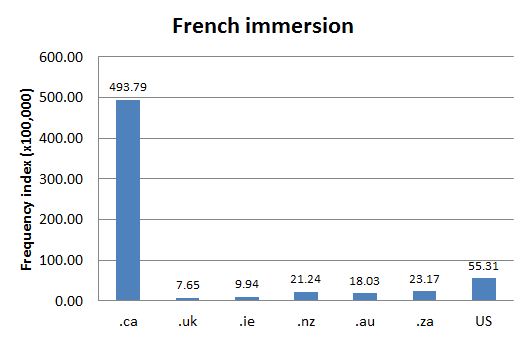DCHP-2
French immersion DCHP-2 (October 2016)
n. — Education, French relations
a method of teaching the French language by using French as a medium of instruction for most subjects.
Type: 1. Origin — Immersion refers to a second-language teaching methodology (of any language) where instruction is carried out in the language to be learned (see OED-3, s.v. "immersion"). French immersion originated in the mid-1960s in Quebec (see the 1984 and 2000 quotations), then spread rapidly across the country (see the 1973 and 1988 quotations) (see Chart 1). Often presented in contrast to core French, immersion arguably produces better speaking skills than other methods (see Wesche 2002 for a history of the approach), yet dissenting voices exist (see, e.g. the 2015 quotation).
See also ITP Nelson, s.v. "French immersion", COD-2, which marks it "Cdn".See also: anglophone core French early immersion late immersion
- Immersion is now used as a method of language instruction for a wide variety of languages, including heritage languages, i.e. languages spoken by immigrants and Canadian-born ethnic group members and their families at home.
References:
Images:
Chart 1: Internet Domain Search, 10 Aug. 2012
